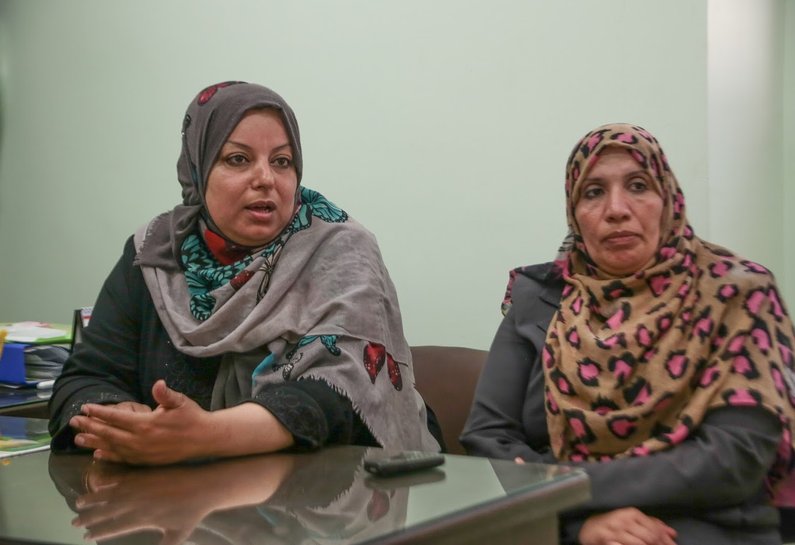“The fear of not getting therapy amplified my suffering”

Aseel Baidoun, Advocacy and Communications Officer for Medical Aid for Palestinians (MAP) in the West Bank, met with Noha, a Palestinian woman from Gaza, to discuss the many difficulties she has faced as a breast cancer patient.
“My son, Mohammad, was 29. He was a pharmacist and working a night shift. The electricity went off as is common due to the electricity crisis. Mohammad turned on the fuel generator but apparently there was a fault and poisonous gas was leaking out. No one was around Mohammad and he passed out, and a few hours later he was found dead on the floor,” Noha said.
The tragedy took place in 2011. Three days later, Noha felt a lump in her left breast that caused some pain. But she thought it was a result of the grief and pain she felt after losing her son. Noha explained, “the pain was increasing, and the lump was getting bigger, but I didn’t care, and I didn’t tell anyone. Honestly, I thought it would be better if it was a serious illness, then I could be with Mohammad soon. Four months later, the lump was big, and the pain was unbearable. I decided to tell my family. After a biopsy, I was diagnosed with stage three breast cancer. I had a mastectomy (surgical removal of a breast) and eight sessions of chemotherapy at Al Shifa Hospital in Gaza.”
Noha was able to get five of the chemotherapy sessions on time, but this was not the case for the last three. Al Shifa Hospital at that time reported that most essential medications, including chemotherapy, were at zero stock, with less than a month’s supply left on the shelves or completely depleted. Noha had to wait many months until the hospital was able to secure the medicines needed to complete her therapy, albeit with potentially decreased effectiveness caused by delay.
Noha said, “Imagine how hard that period of uncertainty was on cancer patients. Instead of waiting three weeks between each session, we were waiting months. I was visiting the hospital every week asking them if they were able to secure the treatment. It was really exhausting. I was already worn-out from the illness, but the fear of not getting the therapy amplified my physical and mental suffering”.
Noha is one of many women who regularly visits the women’s health centre in Al Bureij refugee camp, which is run by MAP’s partner the Culture and Free Thought Association (CFTA). The centre provides services to women including physiotherapy, reproductive health care, psychosocial support, and health education.
Noha explained how lucky she feels to have joined the centre in 2015: “I got the chance to meet all these amazing women who survived cancer, just like me. They were inspiring. In addition, they provide us with physiotherapy sessions to reduce the swelling of the arms. Before the sessions, I suffered a lot from my swollen arm. However, the best thing that happened to me in the centre was getting the breast prosthesis and specialist bras. Since the mastectomy, I felt embarrassed with my body. Even when I was at home, I was stuffing cotton or any cloth into my bra. But now, with the prosthesis, I feel more confident with my body.”
Noha added that there was, however, one incident where she regretted having the prosthesis on.
In 2018 her sister, who lived in Ramallah, passed away. Noha applied for an urgent permit to exit Gaza through Erez crossing to attend the funeral. The Israelis asked for many papers, including the death certificate. The permit got delayed, but it was approved after a few days. At the checkpoint, Noha went in the first security scanning machine. There, Israeli security personnel gave her a difficult time because of her breast prosthesis. They assumed that Noha was hiding something in her bra. She tried to explain that she was a breast cancer patient, but they did not listen.
Noha added, “the soldier started screaming at me, and they put me in an isolated room. I told the female soldier that it is just a prosthesis. I even took it out and showed it to her. She could not care less. She insisted that I should take off all my clothes, including the bra. I started crying. I wear a hijab, and I really feel uncomfortable with someone making me strip, even if it was a female. They kept me in the room for some time naked, and they took the prosthesis for inspection. Afterwards, they interrogated me for hours. I did not know what to be angry about, is it my sister’s death? The humiliation at Erez? Or my struggle after the mastectomy?”
Name changed to protect identity
Related content


